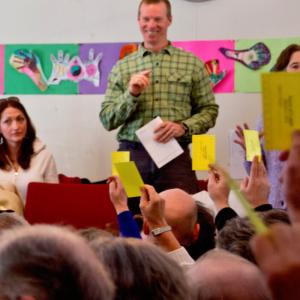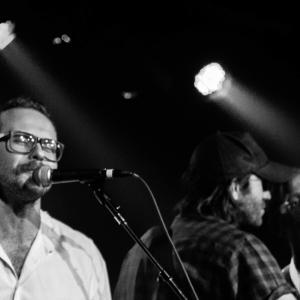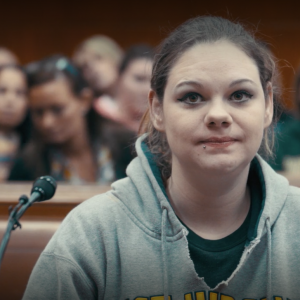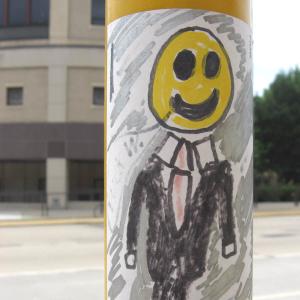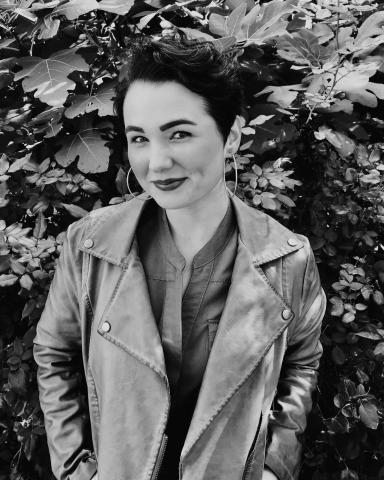
Christina Colón is former associate editor of Sojourners magazine. She rejoined the staff of Sojourners after previously serving as an editorial fellow and as assistant editor of sojo.net.
A writer and editor, Christina believes in telling stories that are rooted in truth and imbued with hope. She embarked on her first editorial role at the age of 9 when she co-founded the short-lived, investigative neighborhood newspaper, The Pink Street Times. Since then, Christina has served as an editor at Global Press Journal, where she coached women reporters in more than 40 communities around the world, and as the communications manager of Washington Nonprofits. She has published work with The National Press Club Journalism Institute, the Faith & Money Network, and Sojourners. In 2018, she was selected to be a member of the Solutions Journalism Network’s #MeToo reporting cohort through which she wrote about sexual harassment in housing, an issue that has gone chronically underreported in the United States.
Christina holds a degree in sociology and anthropology from Centre College and a certificate in editing from The Poynter Institute and the ACES. She is a certified trainer in workplace integrity through the Freedom Forum Institute and a member of the Solution Journalism Network's Journalist in the Classroom program, which connects solutions-oriented journalists with university students and educators. When not pedaling away on her DeskCycle, Christina enjoys long walks and tending to her growing flock of succulents. You can follow her on Twitter @CJaneColon.
Posts By This Author
Writing a Soundtrack of Reconciliation
Urban Doxology uses the language of worship to reimagine community.
ON A TUESDAY EVENING in February, the band called Urban Doxology rehearses for an upcoming performance in Richmond, Va. They jump from song to song without sheet music or a printed set list.
“We who believe in freedom cannot rest,” they sing. “We who believe in freedom cannot rest until it comes.”
The group’s founder, David Bailey, watches. Dressed in a pink button-down shirt and a brown fedora, Bailey moves about the rehearsal space adjusting sound levels and giving occasional feedback.
Ten years ago, Bailey was leading music at a church in the suburbs when he and his wife felt called to join a budding multiethnic, economically diverse worshiping community in the Church Hill neighborhood of Richmond’s East End, where Patrick Henry gave his famous “Give me liberty or give me death” speech in 1775.
Over time, the community grew into a church, East End Fellowship. It found a home in the Robinson Theater, a brightly colored community arts center named after Bill “Bojangles” Robinson, a Richmond native and tap dancer.
Committed to the work of reconciliation, Bailey began leading cultural competency trainings less than four miles from Monument Avenue, a divided street peppered with statues of confederate leaders, including Robert E. Lee, Stonewall Jackson, and Jefferson Davis. Grounded in theology and history, the training provided members with a shared knowledge and language to talk about race. However, Bailey sensed it wasn’t enough.
He noticed the lack of leadership development for people of color going into vocational ministry. He had also grown wary of the available worship music repertoire. “It was like you either had old-school gospel or we had retuned hymns,” he said. East End Fellowship needed more leaders and new songs, ones that better reflected its growing multicultural congregation.
Bailey devised a single solution for the two challenges: a summer internship program dubbed the Urban Doxology Songwriting Internship. “We started the internship so we could develop the kind of leaders we wanted to see as people of color,” Bailey said. “But also so we could create the kind of culture and language for worship that shapes the imagination and deals with the pastoral concerns of the people in the community.”
In 2011, East End Fellowship welcomed its first class of diverse young musicians to Church Hill.
Music for Turbulent Times
Bigger Than Your Box, by Joy Ike. joyike.com
WITH THE ONGOING shattering of silence through the #MeToo movement and a record number of women running for office, 2018 feels unstoppable in its forward movement. Infused with bold rhythms, Joy Ike’s latest album, Bigger Than Your Box, could easily serve as the soundtrack of this march.
While described by Ike as a “political album that has nothing to do with politics,” Bigger Than Your Box conjures up images of self-serving leaders, complacent neighbors, and waning nostalgia. “You may want to go back where you’ve come,” Ike sings in “Say Goodbye.” “But there’s nothing for you and it’s not an option.”
How to Combat Political Apathy
How do we reconcile our vote with our conscience?
IN A TIME of voter suppression, gerrymandering, and persistent political scandals, it’s easy to wonder if voting matters anymore. Many people don’t vote at all, citing everything from long lines to ethical squeamishness. But not voting is still a vote, with real consequences for our democracy. Here are a few ways to reframe the way we think about voting:
1. Make it more than a vote
Voting is just one aspect of civic participation. Extend the action by engaging in your community. Participate in events at recreation centers, run for school board, and attend public forums on local policy. Don’t make a ballot the only place you voice concerns—communicate with local officials and speak up at city council meetings. Think wisely about how you spend your money and your time, and make civic commitment an everyday mindset rather than an annual event.
2. Think globally
Thinking about one’s individual ballot, by itself, can make voting feel uncomfortably personal and easy to dismiss. Instead, consider how your vote impacts those outside the voting booth. Many people are unable to vote in some or all elections, including legal permanent residents, U.S. citizens living in U.S. territories, and, in many states, formerly incarcerated persons. Think critically about how proposed policies will impact these individuals. Be mindful of a candidate’s disposition toward the world. U.S. foreign policy is felt worldwide—vote with our global neighbors in mind.
3. Recognize that voting is an extension of your faith
While you won’t find a Bible verse commanding Christians to vote, we are called to care for marginalized communities that may be adversely affected by social policies. Sometimes we have strong affinity for a candidate, and other times we feel that one is the lesser of two evils. To vote is to recognize that community is messy and people who run for political office are rarely perfect. In the moment, voting doesn’t always seem worthwhile or meaningful, but it is an act of hope, an expression of trust in the power of collective agency to build a more just future.
Fighting for Home
What the ‘Longest Blackout in American History’ Tells Us About U.S. Priorities
It’s been over four months now since Maria hit the island, and 1.36 million Puerto Ricans are still without power in what is being called the “longest and largest blackout in American history.” While they wait in literal darkness, my abuela sits in a memory one.
Beware of Greeks...
How did sororities and fraternities go from service to sociopathy?
“IS GREEK LIFE Worth Saving?” asked a recent U.S. News & World Report article. It’s a question others are asking since Indiana University became the seventh university to suspend the activities of its fraternities and sororities. Four deaths in a year attributed to the fraternity pledge process are a clear sign that “Greek life” has a problem.
Yet fraternities aren’t going away. In fact, journalist John Hechinger estimates that at least 380,000 male undergraduates belong to Greek-letter organizations, a 50 percent increase over the last decade. And while millennials are flocking to Greek life, even more are abandoning the church.
A 2015 Pew study found that only 27 percent of millennials attend a religious service on a weekly basis. It’s something college Christian organizations are noticing, and why InterVarsity now sponsors “Greek InterVarsity,” purporting that one can be both “Greek” and Christian.
It’s an interesting approach. However, considering these deaths—and the numerous sexual assault allegations made against fraternity men—some wonder if InterVarsity is making the right decision. It’s time to ask how people of faith can effectively combat the toxic behaviors—prejudice, misogyny, and addiction—that are allowed to flourish within the Greek college and university systems.
Tuned to Trouble and Faith
Wendigo, by Penny and Sparrow. Single Lock Records.
It’s been a year of unease. Neo-Nazis, hurricanes, and threatening tweets sent by orange-tinged fingers have left me wondering, “What’s next?”
Wendigo , the latest album from indie folk duo Penny and Sparrow (Andy Baxter and Kyle Jahnke), didn’t answer that question for me. Rather, their somber melodies provided something I didn’t realize I needed—space to confront the uncertainty.
According to Chippewa poet Louise Erdrich, the wendigo “is a flesh-eating, wintry demon with a man buried deep inside of it.” Some Indigenous communities see environmental destruction, exclusion, and greed as indicators of “wendigo psychosis.”
Many wendigos seemed to appear after the 2016 election. Not just in the White House, but also in families, friends, and neighbors. The song “Kin” calls to mind Thanksgiving dinner with pecan pie and family members-turned-strangers. “Where the hell did your spine go? / Did you cut it out? / Did it never grow?” the lyrics ask.
Meet the Women Fighting West Virginia's Drug Epidemic
In many ways, drug court functions like church. The men and women sit side-by-side in pews. They welcome newcomers. They hold each other accountable. And though there is no set time for a “passing of the peace,” when they cheer on those who have remained sober, it looks like a place of forgiveness.
Better Business for a Better World
In a profit-driven world, B Corporations offer a refreshingly holistic--and practical--alternative.
WHAT DO PATAGONIA, Ben & Jerry’s, and Etsy have in common? They’re all B Corporations. As part of the B Corp movement, they have committed to using business to build a better and more sustainable world. Along with 2,294 other corporations, they have signed a “Declaration of Interdependence” and are attempting to redefine the for-profit sector.
To become a B Corp, businesses must complete the B Impact Assessment, which scores the company on its environmental impact, relationship to its workforce, commitment to the community, and transparency in governance, as well as the benefit of the product to customers.
In 2016, the B Corp Community launched the “inclusive economy challenge” to encourage for-profit entities to think critically about the economy and work to create opportunities for all people to flourish. During the pilot year, 175 B Corps took on the challenge; together they eliminated wage gaps and expanded company ownership.
Director of ‘The Florida Project:’ Poverty Isn’t Just a Florida Problem
"Especially in this day and age, we already are living in tough times…I’ve seen people looking to things like film and television as a means of escape, so I have to acknowledge that people are spending their hard-earned money to go to a movie on a Friday night and want some sort of escape....My hope is that along with getting that escape, they will be positively motivated," says the filmmaker.
‘The Florida Project’ Shows How to Tell Good Stories About Poverty
Orlando, Fla. is most known for the Walt Disney World theme parks that draw millions of visitors to the area each year. Yet few realize that the discount hotels they drive past on their way to the parks are occupied not by tourists, but by the homeless. They’re who The Florida Project director Sean Baker refers to as the “hidden homeless,” as they live, mostly unnoticed, at the fringes of the billion dollar resort. In The Florida Project, their stories find a platform.
Sweetheart or Serpent? Taylor Swift and Our Purity Problem
While there are those who have embraced Swift’s new sound and video, many fans were horrified to witness “America’s sweetheart” claw herself out of her own grave. Perhaps the most startling image is the one in which Swift stands atop a mountain of past selves. It’s unnerving to watch the white T-shirt wearing “You Belong With Me” Swift lose her grip and fall with arms outstretched into the blackness.


